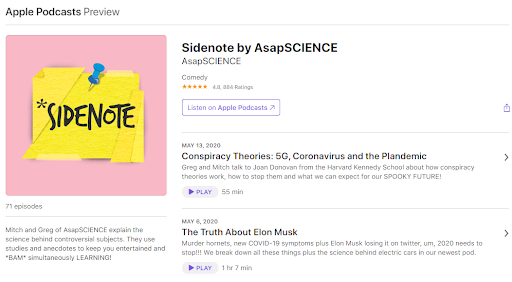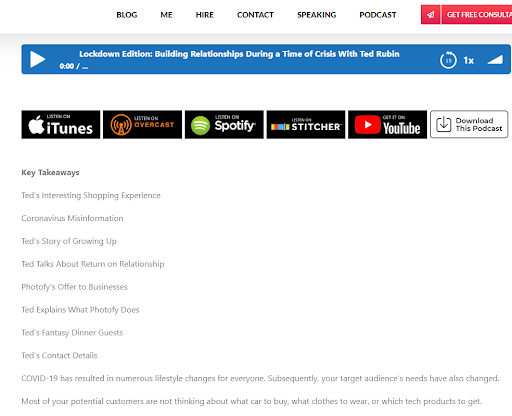30-second summary:
- Podcasting can add a new dimension to your brand and content marketing strategy.
- There are many ways you can approach this, utilizing different mediums, channels, and distribution methods to accomplish this, but many content marketers stick to the basics, almost exclusively focusing on written content.
- Georgi Todorov shares a comprehensive guide on podcast content which encompasses the benefits, SEO perks, types of podcast content, publishing and marketing platforms, and a lot more!
If you have a content marketing strategy already in place, you’re no stranger to the fundamental principles that guide it. Your goal is to naturally attract more readers, fans, and followers by providing them with information and/or entertainment they want to consume. There are many ways you can approach this, utilizing different mediums, channels, and distribution methods to accomplish this, but many content marketers stick to the basics, almost exclusively focusing on written content.
If you want to stand out from the crowd, reach new audiences, and capitalize on a medium with enormous momentum, you should consider starting your own podcast. But how can you integrate podcasting with the rest of your content marketing campaign?
Why podcasts?
First, let’s talk about why podcasts are so valuable in the context of content marketing. A podcast is a series of pieces of audio content, usually released regularly in the form of episodes. These episodes vary in length and format, with some primarily unfolding as interviews and others attempting to provide an entire narrative experience.
Five big benefits of podcasting
In any case, there are several benefits to using podcasts:
1. Current popularity
Podcasts have become incredibly popular in the past several years. There are currently more than a million podcasts, with 30 million episodes between them, and more than half of all households are podcast listeners. Podcasts still seem to be on a fast growth trajectory, as more people discover and become immersed in the medium.
2. Ease of entry
Podcasts are also valuable because of how easy they are to create. Make no mistake, you’ll still need to put the effort in, just as you would with any kind of content. However, you can get started with a relatively inexpensive assortment of equipment, and you don’t need any special training in audio engineering to make an episode that sounds good.
3. Cross-medium potential
Podcasts are also a gateway to produce multiple forms of content simultaneously. For example, you could record video of an interview you conducted with an industry leader, then release it as a video, a podcast, and as a blog (with a written transcript), capitalizing on the content in three ways.
4. Collaborative potential
The interactive audio experience lends itself well to collaboration, you can benefit by going on other podcasts, and other industry experts can benefit from attending yours. This cross-pollination effect allows you to spread your influence more easily, while also getting help creating new content.
5. New audience segments
Some people who prefer listening to podcasts may never discover your work unless you break them in with audio content. In any case, you’ll be able to reach new segments and existing segments in new ways, broadening your audience.
Podcasting as a new content marketing channel
With those benefits in mind, the best way to think about podcasting in content marketing is to think of it as a new content marketing channel. Content marketing always has the same overarching goal. You want to give people content they want. This could mean providing them with answers to their questions (which is especially important if you’re optimizing for search engines), or merely entertaining them.
Take ASAP Science as an example. The popular Youtube channel has racked up over 9.3 million subscribers since launching over seven years ago. About two years ago, they launched a podcast called Sidenote to supplement their popular video content.
Each content marketing channel represents some way for consumers to find your content and consume it. For example, there’s blogging, email marketing, social media marketing, and videocasting – in some ways, podcasting is just another lead generation channel to add to your repertoire.
As with the addition of other channels, the best way to harness the power of podcasting is by treating each channel as a complementary unit in a broader whole. For example, you’ll use your email newsletter to showcase your best blogs, and you’ll call for email newsletter signups in the body of your blog posts. This allows channel-specific consumers to discover your other mediums and helps keep your brand top-of-mind in many areas.
If you decide to podcast, you’ll need to take advantage of this, leveraging your existing channels to push your podcast and using your podcast to deliver listeners to other channels.
This is what Neil Patel and Eric Siu did to launch their four-year-old podcast, Marketing School. Both are well-recognized experts in the field of online marketing, and they leveraged their existing content channels, including their blogs and email lists, to launch Marketing School, which now enjoys over 1 million downloads per month.
Podcasts and SEO
Podcasting also requires attention to search engine optimization (SEO) in two main ways. First, if utilized properly, podcasting can boost the search engine visibility of your main site.
You can list and distribute your new podcast episodes as individual pages of your site, much like a blog, and if you provide adequate titles, meta information, and episode transcripts, you’ll easily have a new way to optimize for specific keyword phrases. Each new podcast episode will also be a piece of content that can be discovered in search engines. This is the approach Shane Barker takes with his podcast, Marketing Growth Podcast.

Over time, as your podcast becomes more popular, it will attract more citations and other types of links. This is vital for improving your domain authority, which in turn will make it easier for your site to rank. If you’re interested in building a separate domain, you can do that too, using your podcast as an engine of exclusive support.
There’s another way to think about SEO, however. Podcasts are an avenue to grow the authority and visibility of your main site—but you also need to think about promoting the podcast’s authority and visibility. Most people discover podcasts by browsing podcast distribution networks and conducting searches for topics that interest them. Accordingly, you’ll need to optimize for these podcast-specific search engines.
The process for optimizing a podcast for podcast networks is very similar to website-specific SEO, you’ll need to optimize for specific keywords and improve your reputation. Take, for example, the aptly-named podcast The Fantasy Footballers, who rank very well in search results for their niche, “fantasy football.”

In addition to your podcast’s name, you’ll need to collect as many ratings and reviews as possible, which means calling listeners to action each episode and ensuring you provide them with high-quality material.
The saturation dilemma: Finding a unique angle
The 30 million podcast episodes currently in circulation are a sign of podcasts’ popularity, but this is both a good thing and a bad thing. It’s a good sign that you’re onto a hot channel, but it also means you’re facing a ton of competition. The podcast market is, in some ways, saturated, and if you want to succeed, you’ll need some way to stand out.
Four ways your podcast can be unique in some way
1. A new topic
You could introduce an entirely new topic to the podcast world — something no one has covered before. Given the length of time podcasting has been around and the sheer number of people trying to do this, finding a truly unique topic may be exceedingly difficult.
2. A different format
You may also try to take an existing topic and cover it in a different format. Instead of short episodes, you could do deep, two or three hour dives. You could also try to produce bite-sized segments, five minutes in length, to capitalize on audiences with minimal free time. If most people in this space are doing interviews, you could create a narrative or vice versa. It all depends on your goals.
3. Strong opinions
It’s also possible to differentiate your podcast by offering strong opinions on a given subject. It’s okay to be controversial, even if some people disagree with you, they’ll be inclined to voice their contradicting opinions, which will only bring more attention to your work. Just make sure you’re still being respectful in your expression of your opinions.
4. A different tone
You can also consider introducing your topics with a different tone. For example, if people usually treat this topic overly seriously, you could give it a cheeky, tongue-in-cheek spin.
However, you choose to be unique, make sure you’re also showcasing your authentic self. People listen to podcasts in part because they feel like they get to know the hosts; if you’re trying too hard to put on airs or if you try to use a personality that isn’t your own, you’re going to turn people away.
The quality factor
It should go without saying that your podcast needs to be “good,” or people won’t listen to it. But what exactly is a “good” podcast?
As with written content, there are some easily identifiable hallmarks of “good” work, but also some harder-to-place subjective qualities you’ll need to consider. Listen to a lot of podcasts to get a feel for what you like and don’t like.
The most important quality to strive for is value; are you providing listeners with something they find valuable? Beyond that, you’ll need to think about the integrity of your recording; are your voices coming through loud and clear, with little to no background noise?
Distribution and promotion
Much of your podcasting success will depend on your ability to distribute and promote your work. Let’s say your podcast is objectively the best podcast ever recorded, it’s funny, informative, and has something for everyone. That’s still no guarantee of success. If people aren’t able to find and listen to it, they’ll never even know what they’re missing out on.
Accordingly, you’ll need to make additional efforts to improve its visibility. As we already covered, it’s important to optimize your podcast for search engines. It’s also important to distribute your podcast on as many podcast distribution networks as possible. Spotify is the biggest podcast platform currently, but Apple Podcasts is also a major player, and there are several smaller platforms to consider. It doesn’t take much effort to list your work in these channels, so you might as well do it.
You’ll also want to publish new work on a consistent basis. Many podcasters strive for a weekly new episode or even a daily new episode, but the frequency isn’t nearly as important as the consistency. Consistency is what allows you to retain your existing audience and snowball new listeners into your fanbase.
In addition to distributing your podcast on multiple platforms, you’ll want to promote your work so people can find it easily. Again, cross-promotion on your other content channels is ideal here, but if you want a quicker route to early momentum, consider paying for advertising.
As your podcast begins to mature, you’ll want to spend extra effort nurturing your existing audience to encourage their loyalty (and hopefully get more referrals). Respond to comments on your podcast episodes when you can, thank your listeners regularly, and get involved on social media; you can even consider starting a Facebook Group or similar network for your fans. Here’s a guide with 101 tactics to promote your podcast.
A note on monetization
This guide assumes that you’re using podcasting as a way to market your brand or website overall. Accordingly, it’s a form of advertising on its own. However, it’s worth noting that if your podcast accumulates a significant enough listener base, you may be able to monetize it.
Ads, sponsorships, and affiliate deals can all help you offset the costs of recording and establish a separate stream of revenue — but they may also turn some audience members away.
Content marketing touchstones: Measurement and analysis
As with other elements of your content marketing strategy, the only way to tell if your podcasting strategy is working is to measure and analyze your results. How many new listeners and subscribers are you getting? How many times is each episode downloaded? Is your podcast responsible for generating new traffic to your site? How many site visitors eventually download a podcast episode?
Set up Google Analytics or your platform of choice to track these metrics, then experiment. Do people respond better to a certain type of episode that you release? Did your numbers drop off when you took a big risk? More importantly, what trends do you see emerging over time?
Conclusion
Podcasting is a powerful complement to your existing content marketing efforts, and it can stand on its own as a path to revenue generation if you treat it right. But to be successful, you’ll need some way to distinguish yourself from your numerous competitors, a high emphasis on quality, and constant refinement with the help of measurement and analysis.
It’s a complex and nuanced content marketing channel, but getting started is easier than most people think. Give it a try, and see if it can work for your brand.
Georgi Todorov is a digital marketing specialist at Green Park Content. He can be found on Twitter @GeorgiTodorovBG.
The post Guide: How to use podcasting in your content marketing campaign appeared first on Search Engine Watch.
from SEO – Search Engine Watch https://ift.tt/31bcLPA
via IFTTT

No comments:
Post a Comment